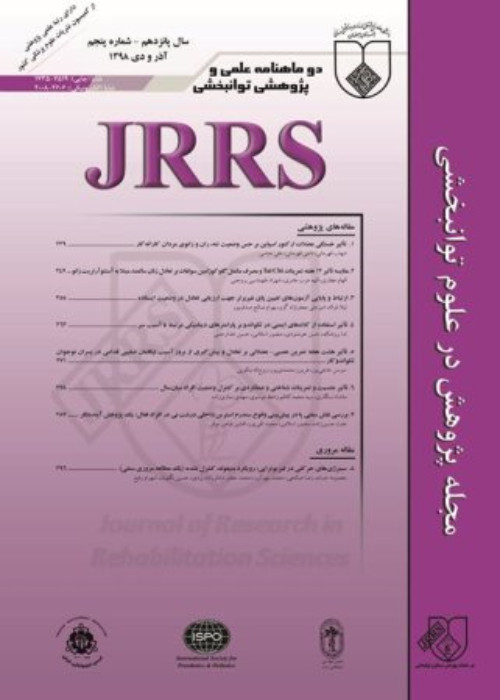Knee Joint Movement Control Using Hybrid Neuro-prosthesis Based on Persistent D-well Time Allocation Strategy with Muscle Fatigue Overcoming: Simulation Approach
Author(s):
Article Type:
Research/Original Article (دارای رتبه معتبر)
Abstract:
Introduction
Hybrid neuro-prostheses are used in rehabilitation of individuals with spinal cord injuries. These hybrid neuro-prostheses consist of a robot that moves the knee joint mechanically and a functional electrical stimulation (FES) part that moves the knee joint by electric current stimulation. The main challenge in the use of hybrid neuro-prostheses is muscle fatigue due to electrical stimulation. This study endeavored to reduce muscle fatigue through timing between robot and FES using Persistent D-well TimeMaterials and Methods
A mathematical equation was used to model the knee movement in a hybrid neuro-prostheses. A differential equation was used to describe muscle fatigue. The simulation time was determined one hundred seconds and the goal of simulation was considered to regulate knee joint in angle of sixty degrees. Simulation time was divided into stages and a time interval was set for each stage. At each stage, FES was active for a certain time duration. After this duration until the end of the time frame of the stage, switch occurred between the FES and the robot, based on the muscle fatigue value.Results
At the end of the simulation, the knee was regulated with a root mean square error of 0.79 degree at the reference angle. Using robots in the timing method reduced muscle fatigue and the muscle fatigue value was limited in a bounded range between 0.94 and 0.97.Conclusion
The timing method simulated in this study can be effective for control of knee movement. Based on the results, it is expected that this method can be used in the control of hybrid neuro-prosthesis in practice during which the exercises prescribed by the therapist are rehearsed and the muscle fatigue increment need to be avoided in the client simultaneously.Language:
English
Published:
Journal of Research in Rehabilitation Sciences, Volume:18 Issue: 1, 2022
Pages:
12 to 23
magiran.com/p2627860
دانلود و مطالعه متن این مقاله با یکی از روشهای زیر امکان پذیر است:
اشتراک شخصی
با عضویت و پرداخت آنلاین حق اشتراک یکساله به مبلغ 1,390,000ريال میتوانید 70 عنوان مطلب دانلود کنید!
اشتراک سازمانی
به کتابخانه دانشگاه یا محل کار خود پیشنهاد کنید تا اشتراک سازمانی این پایگاه را برای دسترسی نامحدود همه کاربران به متن مطالب تهیه نمایند!
توجه!
- حق عضویت دریافتی صرف حمایت از نشریات عضو و نگهداری، تکمیل و توسعه مگیران میشود.
- پرداخت حق اشتراک و دانلود مقالات اجازه بازنشر آن در سایر رسانههای چاپی و دیجیتال را به کاربر نمیدهد.
In order to view content subscription is required
Personal subscription
Subscribe magiran.com for 70 € euros via PayPal and download 70 articles during a year.
Organization subscription
Please contact us to subscribe your university or library for unlimited access!


